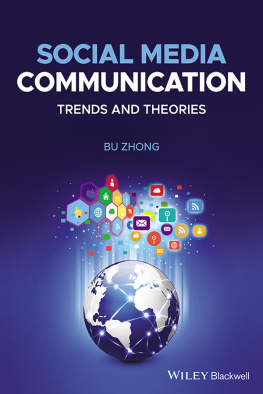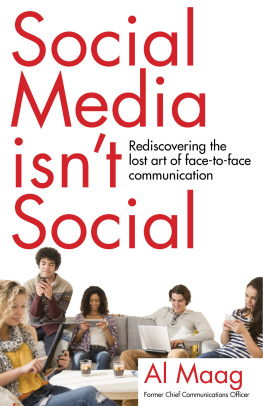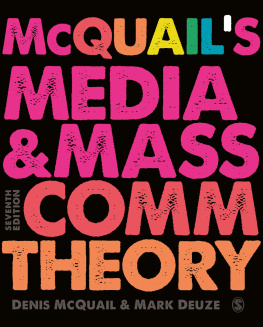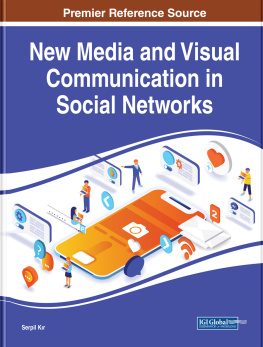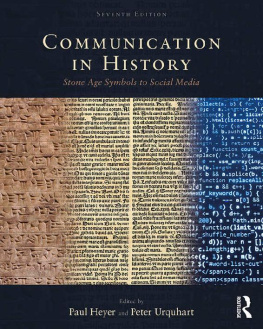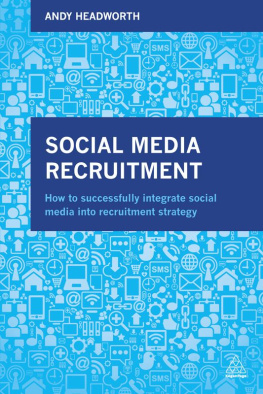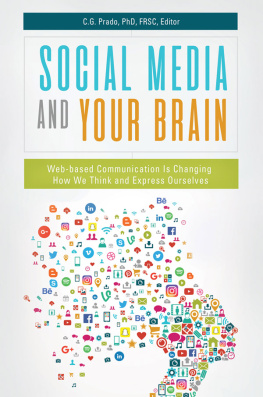Bu Zhong - Social Media Communication: Trends and Theories
Here you can read online Bu Zhong - Social Media Communication: Trends and Theories full text of the book (entire story) in english for free. Download pdf and epub, get meaning, cover and reviews about this ebook. City: Hoboken, year: 2021, publisher: Wiley-Blackwell, genre: Art / Science. Description of the work, (preface) as well as reviews are available. Best literature library LitArk.com created for fans of good reading and offers a wide selection of genres:
Romance novel
Science fiction
Adventure
Detective
Science
History
Home and family
Prose
Art
Politics
Computer
Non-fiction
Religion
Business
Children
Humor
Choose a favorite category and find really read worthwhile books. Enjoy immersion in the world of imagination, feel the emotions of the characters or learn something new for yourself, make an fascinating discovery.
Social Media Communication: Trends and Theories: summary, description and annotation
We offer to read an annotation, description, summary or preface (depends on what the author of the book "Social Media Communication: Trends and Theories" wrote himself). If you haven't found the necessary information about the book — write in the comments, we will try to find it.
Examines the social media mechanism and how it is transforming communication in an increasingly networked society
Social Media Communication: Trends and Theories explores how social media is transforming the way people think and behave. Providing students with an in-depth understanding of the mechanism underlying social media, this comprehensive textbook uses a multidisciplinary approach to examine social media use in a wide range of communication and business contexts. Each chapter is based on original research findings from the author as well as recent work in communication studies, neuroscience, information science, and psychology.
Divided into two parts, the text first describes the theoretical foundation of social media use, discussing the impact of social media on information processing, social networking, cognition, interpersonal and group communication, the media industry, and business marketing. The second half of the book focuses on research-based strategies for effectively using social media in communication and business such as the news industry, heath care, and social movements. Offering detailed yet accessible coverage of how digital media technology is changing human communication, this textbook:
- Helps readers make the best use of social media tools in communication and business practices
- Introduces more than a dozen theories in the areas of communication, psychology, and sociology to highlight the theoretical frameworks researchers use in social media studies
- Identifies a variety of trends involving social media usage, including the app economy and patient care
- Addresses the relation between social media and important contemporary topics such as cultural diversity, privacy, and social change
- Presents 14 imperative social media topics, each with the power to change the ways you see and use social media
Social Media Communication: Trends and Theories is the perfect textbook for undergraduate and graduate courses in communication, business, journalism, business, and information science and technology. It is also an invaluable resource for researchers, educators, journalists, entrepreneurs, and professionals working in media management, advertising, public relations, and business marketing.
Bu Zhong: author's other books
Who wrote Social Media Communication: Trends and Theories? Find out the surname, the name of the author of the book and a list of all author's works by series.

